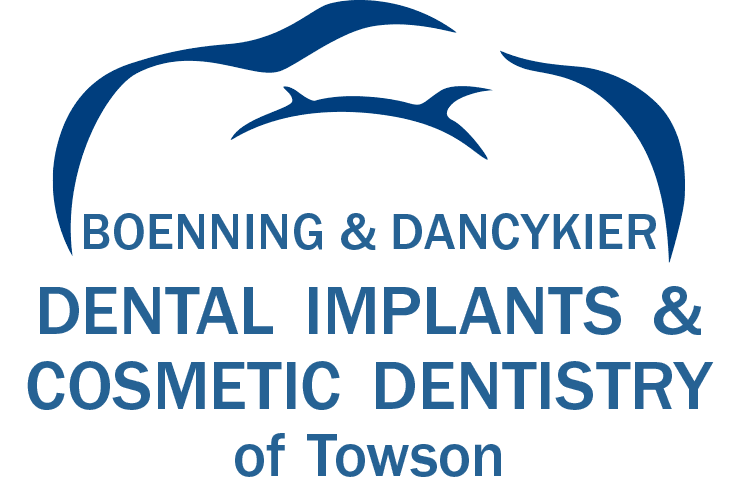Tooth bonding is a simple cosmetic dentistry treatment that uses biocomposite material to cover imperfections. Dr. Keith Boenning and Dr. Nathan Dancykier offer dental bonding treatment in Towson, Maryland. They are professional prosthodontists who restore damaged and missing teeth.
Dental bonding can address tooth stains and discoloration, fix cracked teeth chipped teeth, and minimize minor gaps between teeth. Use dental bonding to makeover your smile after receiving a tooth or gum restoration. You can also restore the color and shape of your teeth using dental bonding.

Benefits of Teeth Bonding
Teeth bonding is a cosmetic treatment that can change the shape, color, and position of your teeth. The bonding material we use can also be color-matched to blend in to create a natural look. The benefits to choosing dental bonding include:
- Minimally Invasive: Tooth bonding is a conservative and minimally invasive procedure. It requires very little tooth preparation. This means the dentist needs to remove less enamel versus treatments like dental veneers or crowns. The dentist will preserve the natural tooth structure.
- Quick and Convenient: The teeth bonding treatment will take a single office visit to complete. This makes it a convenient option for patients seeking fast smile improvements. The procedure is much quicker than most other cosmetic treatments.
- Affordable Option: Dental bonding is much more cost-effective versus to other cosmetic dental treatments such as dental crowns. It provides a more affordable solution for improving the appearance of your teeth while still achieving noticeable results.
- Protects the Tooth: Dental bonding can protect a damaged tooth from further damage. The dental bonding treatment will help restore the dental structure of the tooth and prevent the damage from progressing.
Dental Bonding in Towson, MD
Before treatment, our dentists will review your medical history, budget, and oral health goals to determine if tooth bonding is right for you. To begin, we will prepare any teeth receiving treatment. We may or may not remove a small amount of tooth enamel. The bonding material will perfectly adhere to the tooth with the right preperation.
Then, our dentist will shape and sculpt a biocomposite resin compound onto the tooth. He will make sure the compound is the desired shape, size, and color before hardening it. Lastly, we will use a special light to cure the bonding material onto the teeth.
Dental Bonding vs. Dental Veneers
Patients with damaged or discolored teeth should know and weigh all their options. Dental bonding and porcelain veneers are suitable solutions for the same dental problems. But what is the difference between the two?
Both will resemble natural teeth and blend in with the rest of your teeth. However, they are different aside from that point.
Dental bonding is more affordable, and our dentists can complete the treatment during one appointment. Bonding is not permanent, and your dentist will need to replace it sooner than dental veneers. The bonding compound is not stain-resistant and may darken over time. However, if you have minimal damage such as a small chip or stain, bonding is an excellent fix.
Dental veneers, on the other hand, are more expensive and require several visits to complete. They are a permanent restorative dentistry treatment since a dentist must alter your teeth to accommodate them. They are significantly more durable and can last up to 25 years if properly cared for. If you are looking for a long-last fix to your dental problems, dental veneers may be the way to go.
Patient Review
Teeth Bonding FAQs
Our dental team wants you to feel confident about the dental treatments you are receiving. We provide an atmosphere where our patients are free to voice their concerns and ask any questions. Please read through our teeth bonding frequently asked questions. If you still have questions or concerns, feel free to reach out to us directly.
How long does dental bonding last?
Tooth bonding typically lasts for three to seven years. High-grade composite and porcelain resin materials will last longer than their cheaper alternatives. You should avoid staining foods and drinks that stain teeth. Additionally, some types of bonding may require periodic touchups or replacements to maintain their look and feel.
Does bonding a tooth hurt?
Bonding a tooth generally does not hurt. The process involves applying a tooth-colored composite resin to the tooth, shaping it, then hardening it. We will not touch roots or nerves. Some people may experience sensitivity to the cold during and after the bonding procedure, but this usually goes away.
If discomfort concerns you, your dentist will recommend over-the-counter pain medications that you can take. Most, if not all, our patients say that their bonding treatment was not painful at all.
Can my dentist complete a tooth bonding procedure in a single visit?
Yes, your dentist can complete a tooth bonding procedure in a single visit. A tooth bonding procedure usually takes about 30-60 minutes to complete. The time will also depend on the number of teeth your dentist plans to bond and the complexity of the case. More complex cases may require additional visits.
Is tooth bonding permanent?
No, as durable as tooth bonding is, it is not a permanent solution. Your dentist may need to touch up and replace the work after a few years. Since dental bonding does not require enamel removal, a dentist can reverse it.
The lifespan of bonding can depend on the location of the bonded tooth and your oral hygiene habits. Proper oral hygiene and avoiding biting on hard objects can help to extend the lifespan of tooth bonding.


Does teeth bonding look natural?
Yes, teeth bonding can look natural and like real tooth enamel. An experienced dentist performing this procedure will be able to shape the material naturally into the contours of your tooth. The composite resin your dentist will use closely resembles the color and shade of the natural dentin.
This makes bonding virtually indistinguishable from the original tooth. Your dentist will also take measures such as etching or roughening the surfaces of the nearby teeth before bonding. This step more naturally blends the artificial compound with your enamel for a more realistic look.
Will my dental insurance cover tooth bonding?
It depends on the specifics of your insurance plan. Insurance will only cover damage because of injury or other circumstances. Tooth bonding usually occurs when a patient has experienced cosmetic issues such as permanent stains, chips, or misshapen teeth. Dental insurance companies consider tooth bonding an elective procedure and do not provide coverage for it.
Some dental plans may include tooth bonding in their coverage if they determine you need the procedure for health reasons. Check your policy’s details and contact your provider to figure out what treatments they cover in your plan.
Are you looking for a quick, economical smile makeover for your teeth? Try treatment with dental bonding in Towson, Maryland. Call 410-324-2294 or schedule an appointment with Dr. Boenning or Dr. Dancykier on our website.
Do you have any more questions about tooth bonding or your other cosmetic and restorative options? Let us know at your next consultation. We will be happy to help.
